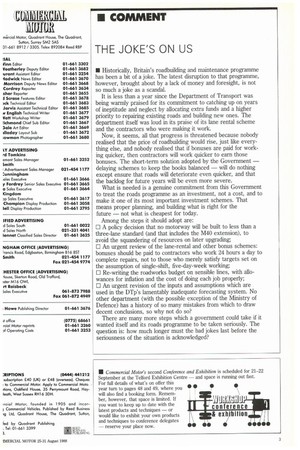THE JOKE'S ON US
Page 3

If you've noticed an error in this article please click here to report it so we can fix it.
• Historically, Britain's roadbuilding and maintenance programme has been a bit of a joke. The latest disruption to that programme, however, brought about by a lack of money and foresight, is not so much a joke as a scandal.
It is less than a year since the Department of Transport was being warmly praised for its commitment to catching up on years of ineptitude and neglect by allocating extra funds and a higher priority to repairing existing roads and building new ones. The department itself was loud in its praise of its lane rental scheme and the contractors who were making it work.
Now, it seems, all that progress is threatened because nobody realised that the price of roadbuilding would rise, just like everything else, and nobody realised that if bonuses are paid for working quicker, then contractors will work quicker to earn those bonuses. The short-term solution adopted by the Government — delaying schemes to keep the books balanced — will do nothing except ensure that roads will deteriorate even quicker, and that the backlog for future years will be even more severe.
What is needed is a genuine commitment from this Government to treat the roads programme as an investment, not a cost, and to make it one of its most important investment schemes. That means proper planning, and building what is right for the future — not what is cheapest for today.
Among the steps it should adopt are:
El A policy decision that no motorway will be built to less than a three-lane standard (and that includes the M40 extension), to avoid the squandering of resources on later upgrading;
0 An urgent review of the lane-rental and other bonus schemes: bonuses should be paid to contractors who work 24 hours a day to complete repairs, not to those who merely satisfy targets set on the assumption of single-shift, five-day-week working; El Re-writing the roadworks budget on sensible lines, with allowances for inflation and the cost of doing each job properly; 0 An urgent revision of the inputs and assumptions which are used in the DTp's lamentably inadequate forecasting system. No other department (with the possible exception of the Ministry of Defence) has a history of so many mistakes from which to draw decent conclusions, so why not do so?
There are many more steps which a government could take if it wanted itself and its roads programme to be taken seriously. The question is: how much longer must the bad jokes last before the seriousness of the situation is acknowledged?
























































